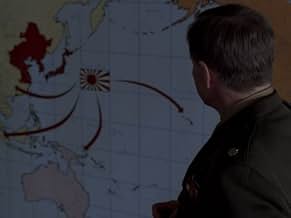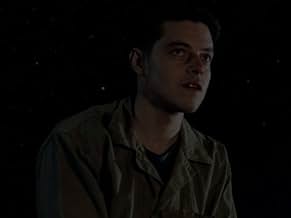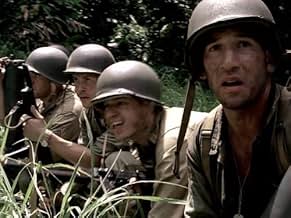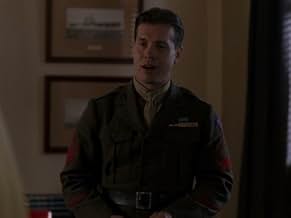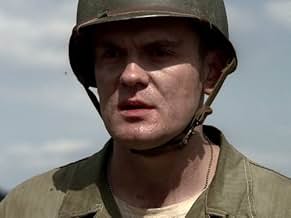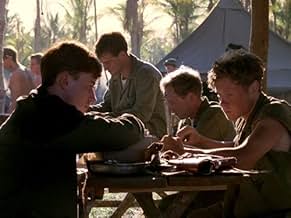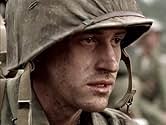Das Pazifik-Theater des Zweiten Weltkriegs aus der Sicht mehrerer junger Marinesoldaten.Das Pazifik-Theater des Zweiten Weltkriegs aus der Sicht mehrerer junger Marinesoldaten.Das Pazifik-Theater des Zweiten Weltkriegs aus der Sicht mehrerer junger Marinesoldaten.
- 8 Primetime Emmys gewonnen
- 36 Gewinne & 44 Nominierungen insgesamt
Folgen durchsuchen
Handlung
WUSSTEST DU SCHON:
- WissenswertesDuring his audition, Rami Malek (Snafu) noticed that the man running the camera was not, as is typical, a young assistant, but an older gentleman who was doing some "very elegant camera work." Midway through his scene, he realized that the camera operator was actually Steven Spielberg.
- PatzerAt about 1:20 into the opening credits, a Navy ship sails into view from the left. On the bow is a small vertical mast (the jackstaff) flying a small flag (the Jack). The Jack and jackstaff are only used when the ship is anchored or moored never when it is underway.
- VerbindungenFeatured in The 62nd Primetime Emmy Awards (2010)
Ausgewählte Rezension
I'm guessing most of us watched 'The Pacific' for at least one of the following 3 reasons:
1. We have an interest in history, particularly in WW2.
2. We are fans of movies and television shows (well, the good ones anyway)
3. We had seen - and loved - the previous Hanks/Spielberg co-production 'Band Of Brothers' and expected a mini-series on the same level.
Now from reading some of the reviews here I gather that third reason was the most important one for many viewers - and it's also why 'The Pacific' apparently left quite a few people disappointed. As for me, I wasn't disappointed - I was devastated.
I'm a lucky man; I've never had to suffer through a war. But I had relatives who did, and though they're all long gone now, I'll never forget their stories. War is the most extreme and outrageous experience humans can possibly endure, but there are many different aspects and layers to it, because a war is not a single experience: it's all the experiences of all the individuals who have to suffer through it, and no single film or TV show can cover all of them. 'Band Of Brothers' focused on certain aspects of a war, and it chose a narrative that helped emphasize what the core theme of the series was: the brotherhood of war. It was about people who retain their humanity and form the closest of bonds under the worst, most horrific circumstances.
That inherently human element in 'BoB' was also why we could identify so well with the protagonists, and why we were - and still are - so deeply touched by what they had to go through. It's an outstandingly well made series, and I can't imagine how those experiences by those soldiers could have been portrayed better. Which is why 'The Pacific' doesn't even try. Instead, it goes almost in the opposite direction by choosing to focus on the sheer insanity of war: the relentless horror and despair of people losing their humanity and their struggle to regain it. Of course, just like 'BoB' it's also about the heroic sacrifices of those brave soldiers, but if there is a core theme in 'The Pacific' it's that of trauma: the trauma of having your humanity stripped from you and your personality shattered; the trauma of witnessing the complete disintegration of everything you thought you were and knowing you'll never be whole again.
What we see in 'The Pacific' is Hell, plain and simple. It's scores and scores of anonymous, young Japanese soldiers running senselessly into machine gun fire, wave after wave, until the piles of their bodies are so high they block the sight for the machine gun; it's American soldiers barely older than kids in despair or completely numb from the sheer amount of random death around them; it's vibrant young men turning into barely alive husks whose only remaining focus is to survive - which means they have to kill other barely alive young men who will stop at nothing to kill them in turn; it's kids killing other kids like rats by any means at their disposal: guns, knives, flame-throwers or with their bare hands; it's people living among the rotting corpses of their dead comrades and enemies and completely losing any regard for human life. And the few moments where we witness how those kids get a brief taste of how precious and beautiful life could be make their fate all the more heartbreaking.
Over large stretches, 'The Pacific' is devastating and depressing to watch, and though I found it never less than compelling, it's actually easy to see why many viewers who had hoped for a similarly engaging experience as in 'BoB' were left disappointed. But this is a different story about different people who fought in a different theater of the war and who went through different experiences, and once you stop comparing it to the story of the men in Easy Company from 'BoB', you'll find that, while different, in terms of sheer quality 'The Pacific' is every bit as good and as much of an outstanding achievement as its more popular predecessor.
The realism, the performances, the music and the production values in the series are superb (this was a 200 million production after all), and the attention to historic detail is simply staggering. As for me, witnessing what these men went through left me devastated; yet I am grateful I've watched 'The Pacifc': because in its relentless depiction of the horrors of war it honors the sacrifice these brave young soldiers made in the hope future generations wouldn't have to do the same. I originally rated this series 9 stars out of 10, but upon a recent rewatch and with more knowledge of the war in the Pacific theater, it's clear that this is a 10/10. Outstanding.
Favorite films: IMDb.com/list/mkjOKvqlSBs/
Lesser-Known Masterpieces: imdb.com/list/ls070242495/
Favorite TV-Shows reviewed: imdb.com/list/ls075552387/
1. We have an interest in history, particularly in WW2.
2. We are fans of movies and television shows (well, the good ones anyway)
3. We had seen - and loved - the previous Hanks/Spielberg co-production 'Band Of Brothers' and expected a mini-series on the same level.
Now from reading some of the reviews here I gather that third reason was the most important one for many viewers - and it's also why 'The Pacific' apparently left quite a few people disappointed. As for me, I wasn't disappointed - I was devastated.
I'm a lucky man; I've never had to suffer through a war. But I had relatives who did, and though they're all long gone now, I'll never forget their stories. War is the most extreme and outrageous experience humans can possibly endure, but there are many different aspects and layers to it, because a war is not a single experience: it's all the experiences of all the individuals who have to suffer through it, and no single film or TV show can cover all of them. 'Band Of Brothers' focused on certain aspects of a war, and it chose a narrative that helped emphasize what the core theme of the series was: the brotherhood of war. It was about people who retain their humanity and form the closest of bonds under the worst, most horrific circumstances.
That inherently human element in 'BoB' was also why we could identify so well with the protagonists, and why we were - and still are - so deeply touched by what they had to go through. It's an outstandingly well made series, and I can't imagine how those experiences by those soldiers could have been portrayed better. Which is why 'The Pacific' doesn't even try. Instead, it goes almost in the opposite direction by choosing to focus on the sheer insanity of war: the relentless horror and despair of people losing their humanity and their struggle to regain it. Of course, just like 'BoB' it's also about the heroic sacrifices of those brave soldiers, but if there is a core theme in 'The Pacific' it's that of trauma: the trauma of having your humanity stripped from you and your personality shattered; the trauma of witnessing the complete disintegration of everything you thought you were and knowing you'll never be whole again.
What we see in 'The Pacific' is Hell, plain and simple. It's scores and scores of anonymous, young Japanese soldiers running senselessly into machine gun fire, wave after wave, until the piles of their bodies are so high they block the sight for the machine gun; it's American soldiers barely older than kids in despair or completely numb from the sheer amount of random death around them; it's vibrant young men turning into barely alive husks whose only remaining focus is to survive - which means they have to kill other barely alive young men who will stop at nothing to kill them in turn; it's kids killing other kids like rats by any means at their disposal: guns, knives, flame-throwers or with their bare hands; it's people living among the rotting corpses of their dead comrades and enemies and completely losing any regard for human life. And the few moments where we witness how those kids get a brief taste of how precious and beautiful life could be make their fate all the more heartbreaking.
Over large stretches, 'The Pacific' is devastating and depressing to watch, and though I found it never less than compelling, it's actually easy to see why many viewers who had hoped for a similarly engaging experience as in 'BoB' were left disappointed. But this is a different story about different people who fought in a different theater of the war and who went through different experiences, and once you stop comparing it to the story of the men in Easy Company from 'BoB', you'll find that, while different, in terms of sheer quality 'The Pacific' is every bit as good and as much of an outstanding achievement as its more popular predecessor.
The realism, the performances, the music and the production values in the series are superb (this was a 200 million production after all), and the attention to historic detail is simply staggering. As for me, witnessing what these men went through left me devastated; yet I am grateful I've watched 'The Pacifc': because in its relentless depiction of the horrors of war it honors the sacrifice these brave young soldiers made in the hope future generations wouldn't have to do the same. I originally rated this series 9 stars out of 10, but upon a recent rewatch and with more knowledge of the war in the Pacific theater, it's clear that this is a 10/10. Outstanding.
Favorite films: IMDb.com/list/mkjOKvqlSBs/
Lesser-Known Masterpieces: imdb.com/list/ls070242495/
Favorite TV-Shows reviewed: imdb.com/list/ls075552387/
- gogoschka-1
- 10. Feb. 2018
- Permalink
Top-Auswahl
Melde dich zum Bewerten an und greife auf die Watchlist für personalisierte Empfehlungen zu.
Details
- Erscheinungsdatum
- Herkunftsländer
- Offizieller Standort
- Sprache
- Auch bekannt als
- Untitled World War II Pacific Theater Project
- Drehorte
- Produktionsfirmen
- Weitere beteiligte Unternehmen bei IMDbPro anzeigen
- Laufzeit53 Minuten
- Farbe
- Sound-Mix
- Seitenverhältnis
- 1.78 : 1
Zu dieser Seite beitragen
Bearbeitung vorschlagen oder fehlenden Inhalt hinzufügen





